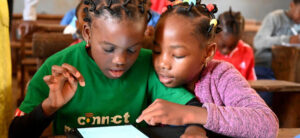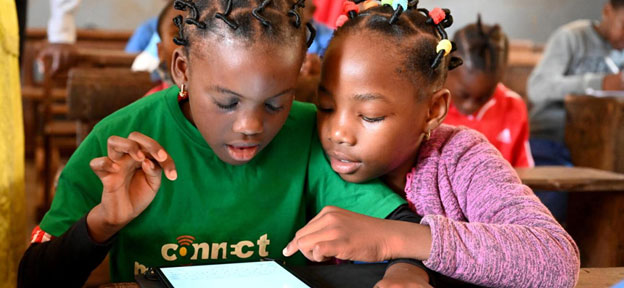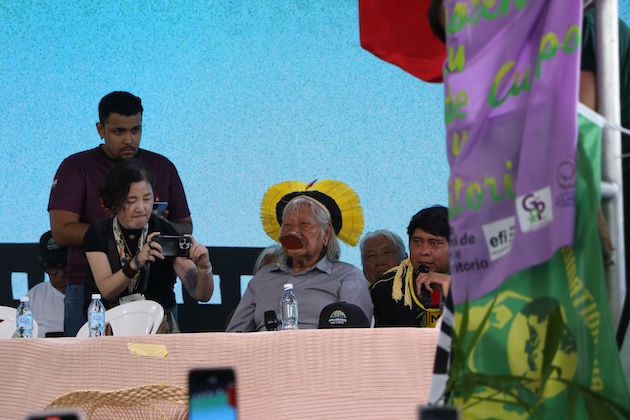
Artificial Intelligence, Civil Society, Global, Global Governance, Headlines, IPS UN: Inside the Glasshouse, TerraViva United Nations

Artificial intelligence is reshaping how learners, teachers, and creators engage with education across the continent. A new wave of AI innovation transforming learning across countries on the African continent — from chat-based tutors to hybrid hubs and gamified farms. Credit: UNICEF
Through initiatives such as Digital Skills for Africa, Lumo Hubs, and Luma Learn, innovators are breaking barriers of access, cost, and language to build inclusive, localized learning systems.
– “Sometimes the best way to grasp a concept,” says Chris Folayan, co-founder and executive officer of Luma Learn, “is to learn it in your native language.”
Seventeen-year-old South African Simphiwe is one of more than 10,000 learners already using Luma Learn, an AI-powered tutor platform. For him, artificial intelligence isn’t an abstract idea: it is a personal tutor that is patient, consistent, and always online.
When on his phone, he’s not always chatting with a classmate or scrolling through social media. Many times, he’s studying physics with Luma Learn, that replies instantly, even in IsiZulu, his mother tongue.
Across several countries on the African continent, innovators like Folayan, Nthanda Manduwi, and Anie Akpe are reimagining what education can look like: localised, practical, and accessible to anyone with a phone or connection.
Together, they’re building a new learning ecosystem: one where AI isn’t replacing teachers but multiplying their reach.”
Nthanda Manduwi: Turning digital skills into interactive ecosystems
“I’ve always believed that technology can democratize opportunity,” says Nthanda Manduwi, founder of Digital Skills for Africa (DSA) and Q2 Corporation. “AI gives us a real chance to leapfrog the barriers that have slowed Africa’s progress, from infrastructure gaps to unequal access to training.”
Her journey began with Digital Skills for Africa, a platform designed to equip young people with practical tech competencies from AI and automation to no-code tools and digital marketing.
“Our courses like ‘Effective Use of AI’ or ‘AI and the Future of Digital Marketing’ were created to help learners not only understand AI but actually apply it,” she explains. “You leave with real, marketable skills you can use to build something or get hired.”
But scaling that vision revealed a challenge many edtech startups face. “We realised enthusiasm alone doesn’t pay the bills,” she says. “There was low willingness to pay for courses, even from institutions. So, we had to rethink how to make digital learning sustainable.”
That rethink led to Q2 Corporation, her new venture linking learning with livelihood. Under Q2’s umbrella sits Kwathu Farms—an innovative gamified agricultural simulator where users learn how to manage farms, predict supply chain issues, and test business models before investing real money.
“AI makes the learning immersive,” Ms. Manduwi explains. “Through simulations, learners can see how weather or market shocks affect yield, and how small decisions impact entire value chains. It turns agriculture into a classroom. And a business lab.”
Behind these simulations run Q2’s proprietary engines, NoxTrax and AgroTrax, which apply AI to real-time logistics and resource management. “It’s about showing that AI isn’t just for coders,” she says. “It’s for farmers, small businesses, anyone who wants to think and plan more intelligently.”
Ms. Manduwi’s mission remains rooted in access. “For Africa to truly benefit from AI, it can’t be an elite tool. It must live where people already are: on their phones, in their communities, in local languages.”
Anie Akpe: Creating spaces where AI meets human creativity
Where Ms. Manduwi builds ecosystems, Anie Akpe builds spaces. Through her work with African Women in Technology (AWIT)and Lumo Hubs, Ms. Akpe has spent over a decade helping innovators, especially women, turn curiosity into competence.
“With AWIT, I started by organising conferences across the continent,” she recalls. “We created safe spaces where women could connect with mentors and learn skills that weren’t taught in schools: digital literacy, entrepreneurship, coding, design.”
Soon, even male students began asking to participate. “That’s when I realized it wasn’t just about women in technology. It was about us (Africans) finding a place in a digital world that was changing fast.”
The next step came naturally. “When AI began to disrupt industries, I saw that we couldn’t just talk about skills. We had to create environments where people could use those skills,” she says. “That’s how Lumo Hubs was born.”
Each hub combines education, creativity, and entrepreneurship. “In one space, you might find a student learning AI-assisted graphic design, a seamstress using AI to plan production, and a young podcaster recording a show in a studio powered by the hub,” Ms. Akpe explains. “The model is hybrid, physical and digital, so even small towns can host a Lumo Hub.”
She is also deliberate about sustainability. “Community members pay; students pay less. It’s important that we don’t depend only on grants,” she says. “That balance keeps the hubs alive and the learning continuous.”
At the heart of Lumo Hubs lies mentorship. “You can’t separate technology from human guidance,” Akpe insists. “AI helps scale learning, but mentorship builds confidence.” Her approach remains rooted in empowerment. “AI can level the playing field if used right. A young person in Lagos or Uyo doesn’t have to wait for opportunity. They can create it.”
Chris Folayan: A tutor that never sleeps
For Chris Folayan, the idea behind Luma Learn came from a simple observation: “The continent doesn’t just have an access problem. It has a teaching gap too.”
According to UNESCO, Sub-Saharan Africa will need 15 million new teachers in the next five years to meet demand. “With classrooms that sometimes have over 100 students per teacher, no one can give every child the help they need,” Mr. Folayan says. “That’s where Luma Learn steps in.”
Luma Learn is an AI tutor that runs on WhatsApp, not a separate app.
“We chose WhatsApp for a reason,” he explains. “It’s already on most phones, it’s free to message, works on low bandwidth, and keeps data safe through encryption. That means a child in a rural area can learn without worrying about internet costs or app installations.”
The platform adapts to the learner’s grade level, curriculum, and preferred language. “Whether you need algebra in English or history in Swahili, Luma Learn can teach, quiz, and explain at your level,” he says. “It learns how you learn.”
Mr. Folayan shares two powerful testimonies. In Durban, a mother named Happyness wrote that her son, after years of illness, seizures, and missed schooling, caught up with the rest of the class with help from Luma Learn.
“Every time Vuyo wants to know something about school, we just ask Luma! What’s great is that Luma explains in our native language, IsiZulu.”
In another case, Simphiwe, a Grade 11 student from KwaZulu-Natal, sent over 1,200 messages to Luma. “Luma Learn wasn’t just another study resource,” he said. “It became the personal teaching assistant I desperately needed.”
Shared goals: One vision, many pathways
Three innovators. Three different models. One shared purpose: to make AI work for Africa’s learners, not the other way around. Across their stories, several threads stand out.
First, access—from WhatsApp tutors to open learning hubs to gamified ecosystems that teach real-world problem-solving.
Second, localisation—learning in local languages, within familiar tools, and around community realities.
Third, empowerment—every model links knowledge directly to opportunity.
From Ms. Manduwi’s gamified farms to Ms. Akpe’s creative hubs, to Mr. Folayan’s WhatsApp tutor, future classrooms are already here — decentralised, digital, and deeply human.
As Ms. Manduwi puts it, “We must stop treating AI as something imported. It’s a tool we can mold to fit our own systems.”
Ms. Akpe echoes that sentiment: “Africa doesn’t lack talent. It lacks platforms that meet learners where they are.”
And Mr. Folayan completes the picture: “No teacher wants their student left behind. With AI, we can make sure no one is.”
At the end of the day, a student in Durban learns physics through Luma. A young designer in Uyo experiments with AI tools at a Lumo Hub. A farmer in Lilongwe tests market scenarios on Kwathu Farms. Each represents a different face of the same revolution — a continent using intelligence, both human and artificial, to learn without limits.
As Ms. Akpe says: “The vision is simple: a generation that doesn’t just survive AI disruption but thrives because of it.” And as Ms. Manduwi concludes: “AI is not a threat to Africa. It’s our greatest chance to catch up. And lead.”
Anie Akpe and Chris Folayan were participants at the Global Africa Business Initiative (GABI): Unstoppable Africa2025, held in New York City on the margins of the UN General Assembly in September. The platform helps foster networking, exposure to potential business partners, and garner support for their initiatives.
Source: Africa Renewal, United Nations
IPS UN Bureau


















